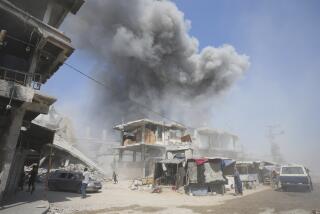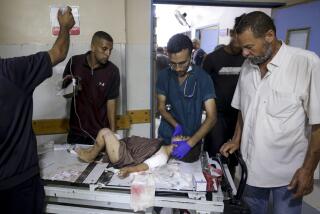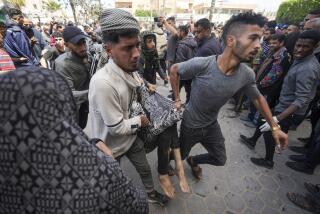Doctors, Aid Workers Decry Gorazde ‘Massacre’ : Bosnia: Fifteen children are among victims of fierce Serbian assault. Hospital and refugee center are shelled.
- Share via
SARAJEVO, Bosnia-Herzegovina — Bosnian Serb gunmen blasted through crowds of refugees in Gorazde on Wednesday, destroying a front-line hospital packed with wounded and leaving despondent doctors and aid workers in the U.N. “safe haven” dumbstruck by the world’s failure to act.
As NATO officials pondered what the West should do in the Balkans, the Serb nationalist rebels pressed their campaign of terror aimed at driving the 65,000 inhabitants out of the last sizable Muslim enclave in eastern Bosnia-Herzegovina.
At least 44 people, including 15 children, were killed in the worst day of carnage since the rebel offensive began three weeks ago.
“This is not a war. This is a massacre,” Alija Begovic, director of the shell-shattered hospital, told journalists here via ham radio as shells detonated in the background.
Ten people were killed by a single tank shell that tore through an apartment building, and a Red Cross worker lost both arms in a direct attack on a refugee center, the last handful of foreign aid workers reported from the anguished city.
The unbridled artillery assault scuttled the latest cease-fire initiative by U.N. officials, who now admit they are powerless to stop the bloodletting or force the Bosnian Serbs to negotiate a settlement.
Asked what leverage the mission has to compel the Serbs to end the indiscriminate killing in the U.N.-protected zone, U.N. spokesman Maj. Rob Annink replied: “None.”
A U.N. civilian official had met with Bosnian Serb leaders in the rebel stronghold of Pale a day earlier to be told the rebels’ conditions for easing the slaughter in Gorazde.
Momcilo Krajisnik, the leader of the rebels’ self-styled parliament, forced the U.N. mission to agree to ensure there would be no reprisals against Bosnian Serb gunmen by Bosnian government troops if the assault was halted and the rebels were allowed to retain virtually all the land they have recently seized in the pocket.
About 100 Ukrainian infantry troops were to be allowed to deploy to the government-held center of the besieged enclave--but they would have to travel under Serbian escort and would only be allowed to assist in feeding 30,000 displaced Muslims the rebels have forced into the city.
The agreement sharply reduced the 1,000 peacekeepers the U.N. mission had ordered for the enclave, as well as conceding the issue of free movement for U.N. military and aid personnel.
The accord was to have been presented to the Bosnian government. But U.N. officials appear to have been too chagrined by its inequities to even present it to the Sarajevo leadership, who surely would reject it.
Bosnian Prime Minister Haris Silajdzic said he had not been approached by U.N. officials since they accepted the measures; he said his government considered it unacceptable for the United Nations to have a role in the Bosnian Serbs’ push for Gorazde’s surrender.
At the highest levels of the 15,000-strong U.N. mission in Bosnia, a sense of resignation has set in that nothing can save Gorazde. One senior military official, asked if North Atlantic Treaty Organization endorsement of wider latitude for calling in air strikes would be effective, said of Gorazde: “It’s gone. There’s nothing we can do about it.”
The capitulation of the U.N. Protection Force, which is supposed to guard Gorazde and five other U.N.-declared havens, stirred angry words from horrified Western relief workers trapped in the mostly Muslim city.
Members of Doctors Without Borders and the International Committee of the Red Cross joined in an impassioned plea to the world to “put an end to the humanitarian tragedy of Gorazde” and said they were ceasing communications for 24 hours in protest against Western indifference.
Four staff workers of the Office of the U.N. High Commissioner for Refugees in Gorazde also relayed images of horror from the siege, saying shelling and sniper fire were so intense it was impossible to retrieve the dead and wounded from the streets.
“Conditions for refugees and residents in the town are appalling. They have no food and have to risk their lives to get water,” said Mary McLaughlin, an Irish doctor trapped in the city. “We feel so helpless in the face of this great tragedy for the people of Gorazde.”
Besides the lack of government endorsement for the Gorazde cease-fire terms dictated by the Bosnian Serbs, the U.N. mission struggled with internal obstacles as it sought to put together a convoy to send to Gorazde in the event rebel Serbs hold fire long enough for the United Nations to deploy.
French officers prevented departure of the soldiers and armor at midday in anger over the Bosnian Serbs’ rejection of a British contingent, which had been prepared to go.
The U.N. force, numbering about 140 with logistics and medical support teams, planned to set off for Gorazde today.
More to Read
Sign up for Essential California
The most important California stories and recommendations in your inbox every morning.
You may occasionally receive promotional content from the Los Angeles Times.














